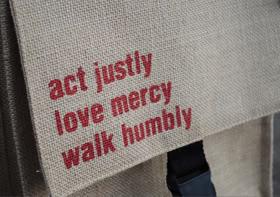
Micah 6:8
In a reflection on Pope Francis the merciful for Washington Post, Father James Martin notes that the turbulence on the papal flight from Brazil back to Rome on which the pope said "gay" is now matched by turbulence in the church, as a result of what he said on the plane. Martin notes that it's important to recognize that what Francis said about gay folks and not marginalizing those who are gay should be understood in the broader context of his remarks during his entire time in Brazil about "social justice," "economic inequalities" and "solidarity." Language about marginalization is of a piece with language about solidarity and justice--a point many news commentators who have focused exclusively on the headline-grabbing "Pope Says Gay" soundbyte have missed.
In Martin's view, here are five specific ways in which Francis's comments about not judging gays are now causing turbulence in the Catholic church:
First, throughout the exchange on the plane, Pope Francis, speaking in fluent Italian, used the English word "gay." Previous popes and the majority of church leaders have been more likely to use words like "homosexual," "homosexually oriented" and even "persons suffering from same-sex attraction." I cannot remember a pope ever using the term preferred by much of the world’s gay community.
Second, the pope’s response to a question concerning gay priests was not along the lines that some might have expected, especially given a Vatican document issued in 2005 that barred men with "deep-seated homosexual tendencies" from the priesthood. Rather than saying, "There can be no gay priests," the pope declined to judge them. He also emphasized that it was lobbies — "any type of lobby, business lobbies, political lobbies, Masonic lobbies" — that were cattivo (evil).
Third, the pope moved rather quickly from a question about a “gay lobby” in the Vatican to a comment about gay people in general. That is, he did not say, “If a gay priest is searching for God,” but “If a gay person is searching for God.” Then his remarkably compassionate comment: “Who am I to judge them?”
Fourth, he did not use words from the Catechism that many gays and lesbian Catholics say frustrate them, like "intrinsically disordered.”"Nor, after saying that gays should not be "marginalized," did he warn against homosexual activity, as might be expected.
Finally, the pope’s tone was eminently pastoral. When you watch the video of his remarks, you hear the voice of a kind pastor. Several of my gay and lesbian friends say the video moved them to tears.
Martin concludes by noting that Francis didn't, of course, change Catholic teaching about the immorality of each and every homosexual act. However, he did something that people who quote this teaching selectively often refuse to do, as they talk about upholding tradition: "[H]e turned to a portion of the old teaching that often goes overlooked: The Catechism says that gays and lesbians are to be treated with 'respect, compassion and sensitivity.'"
Martin notes that Francis's comments are deeply rooted in what Catholics regard as the most ancient tradition of all, the gospels and the life and example of Jesus. Jesus absolutely forbids us to judge the status of the souls of anyone, and he tells us to aim at mercy in all of our dealings with anyone we encounter. This shift in emphasis towards mercy in Francis's papacy is, Father Martin maintains, about more than style: it's substantive.
And I'm certainly willing to listen respectfully and hopefully to arguments such as Father Martin's. But at the same time, since I want my hope to be rooted in reality and not illusion, I have to keep asking, as one among many gay folks who have for far too long experienced the unmerciful, unjust, and downright savage side of contemporary Catholicism, when will the story-a-week about another firing of a gay employee of a Catholic institution or another denial of the sacraments to a family supporting the human rights of gay folks end?
When I stop reading those stories in the daily news, then I'll begin to believe that Pope Francis's new style of mercy is about more than style, and is about substantive change for my church. In the meantime, as long as the new story-a-week keeps breaking, we might as well still be in the era of John Paul II and Benedict XVI--who set this anti-gay ball rolling with their development of the ugly idea that gay people are intrinsically disordered, and who cruelly sought to scapegoat gay priests for the abuse crisis in the Catholic church and barred openly gay candidates from the priesthood.

